A party with a purpose
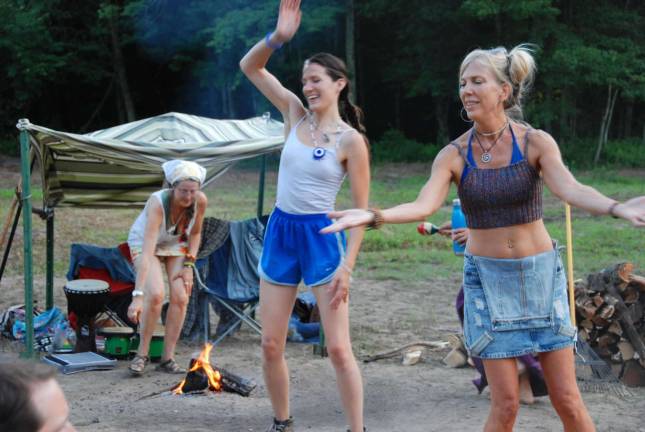
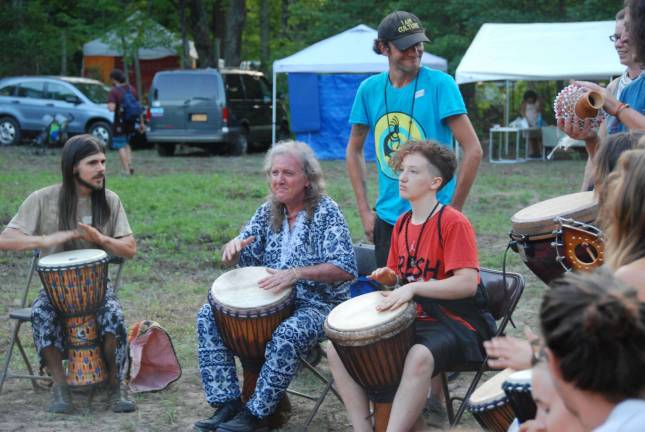
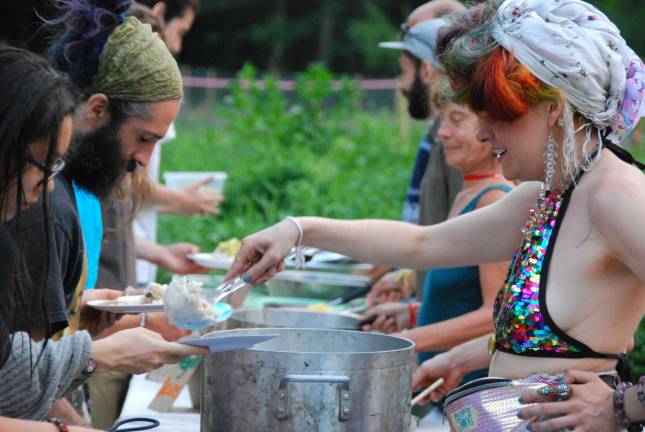
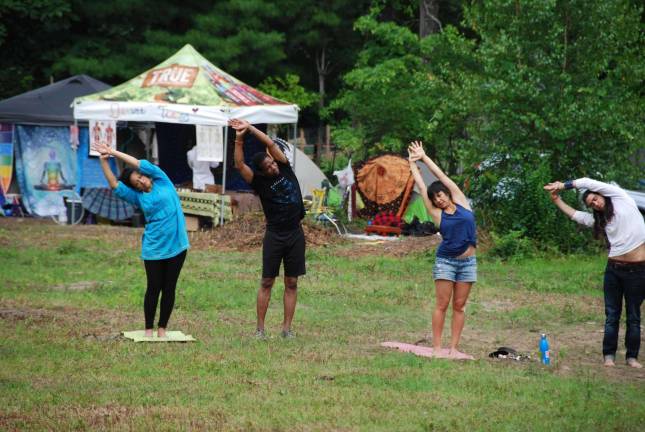
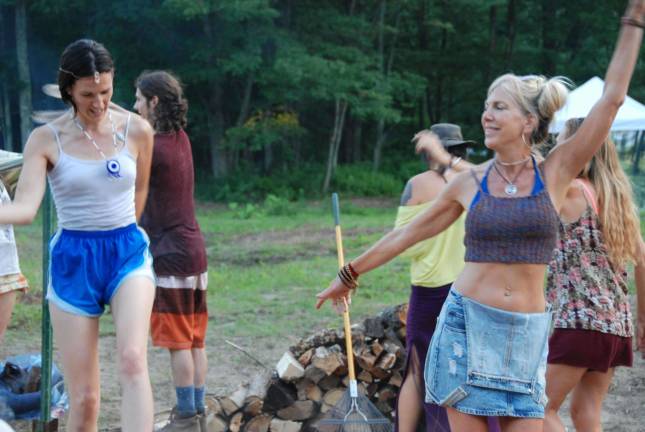
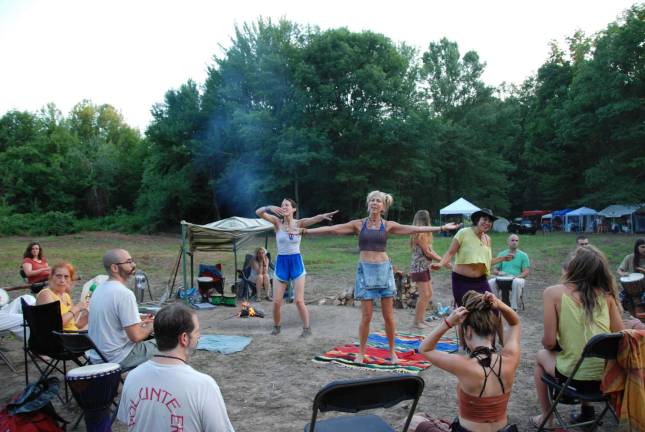
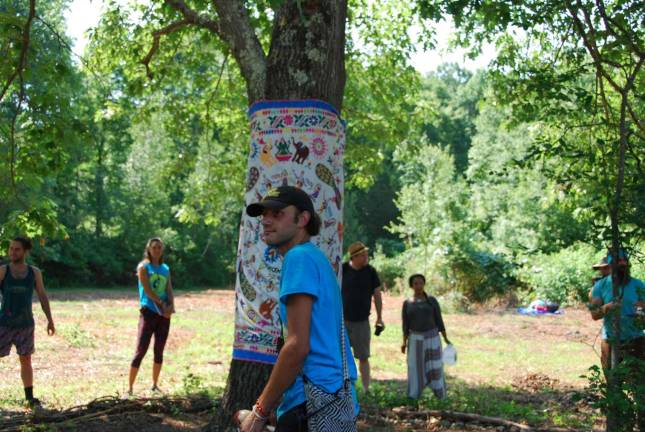
‘As we transform the landscape, we’re transforming ourselves’
By Becca Tucker
I arrived at 125-acre Blossom Dell Sanctuary in Bloomingburg, NY with my five- and two-year-old and our camping gear spilling out of my arms, to cover this Permajam, whatever it was. A music festival with a consciousness? A consciousness raising festival that happened to have music? Something closer to an Amish barn-raising? A baby Burning Man?
I had assured organizer Stefanie Frank that we were hearty homesteading folk and not to worry about us, but Frank, of Brooklyn, told it to me straight. She was also a mom, she wanted us to have a decent time and this land was rough. We’d be fine, I insisted.
First stop: the welcome tent. No one had me on any list. The guy with half his head shaved and the other half in a ponytail who’d been dealing with us wandered off, leaving very pregnant me and the kids on a dusty road with sleeping bags drizzling out of my arms. I was beginning to understood what Frank had been trying to tell me.
Down the dirt road strolled Jon Lee Rucker, the festival’s creator, barefoot. We shook hands. Rucker and I have only met a few times, but we go a ways back, seven or eight years, to what was, for both of us, the beginning of our current journey. We met while weeding a farm field in Rockland County. He was a farm apprentice and I, newly the editor of Dirt, had just joined the farm’s CSA in an attempt to start walking the walk. He taught me that purslane was edible, a tip that would keep me fed in the garden from that day forward.
Now he was kind of a big deal. “A greeting from Jon Lee trumps any list,” said a voice from the welcome tent, and we were given our red yarn bracelets. Rucker led the way to the camping area, successively taking more of our gear as my kids got tired of carrying it and I started dropping it. As we walked, he pointed out the sacred fire – which would stay lit for the entire four days – the horses, the “garbage display.” I laughed, figuring they just hadn’t gotten around to disposing of the recycling and trash. No, it’s serious, he said in his earnest way. All too often we don’t see our garbage. I noticed compost bins strategically placed near food stations, while trash cans were very hard to find. Folks had brought their own plates and cutlery; a dish rack held mismatched extras for those who forgot. We ended up eating out of a Frisbee that I dug out of my car.
After our paths crossed at the farm, Rucker had started down the activism road, staying up until five a.m. researching the military-industrial complex, our food and pharmaceutical industries. At first his journey was a lonely one: family and friends didn’t want to hear all the gloom and doom. Eventually he connected with other young activists, banding together to start a 25-acre permaculture center in Rockland County (permaculture is working with nature to create sustainable agricultural ecosystems). They foraged and gardened, captured rainwater and composted humanure, and forged a relationship with a Lakota elder who built a sweat lodge on the land and taught them about the ceremony.
It was after a prayer ceremony that “Permajam” came to Rucker. “It wasn’t just a word, it was a whole vision,” he said – of people coming together and working the land, envisioning and collaborating on a beautiful way forward. The first Permajam in 2016 took place on a farm in Sussex County, NJ. This year’s new location is a wildlife sanctuary recently bought by a nonprofit that didn’t want to see it developed. The festival is not just a party: it has evolved into a four-year “land blessing ceremony.” The four-year commitment is a common timeframe in Native American cultures. By 2021, the idea is that the land will be set on a sustainable course, with regenerative systems like orchards, rainwater catchment systems, gardens and natural buildings.
For now, though, the property is indeed rough. The recently brush-cut camping area is rife with poison ivy, and as it will turn out, ticks.
We pitch our tent on bristly stubble and wander over to the drum circle around the sacred fire. My girls are shy to try a drum, so we linger around the periphery. The two of them have gone and glammed themselves up while I was setting up camp, donning disco ball clip-on earrings and lipstick. People smile at us, showering them with compliments on their “fabulousness.” It’s not the way grown-ups usually talk to kids, more as kindred artists in the medium of self expression.
A guy named Echo with yarn in his hair blows his conch shell to announce dinner. We strike up a conversation, and he asks whether he can put his hands on my uterus. Sure. With the sureness of a midwife he puts both hands on my pregnant belly and keeps them there for what must be a solid minute, smiling and laughing in such a joyous way that I feel laughter bubble up, too.
A bearded redhead in genie pants walks by and says aloud to no one in particular, “I love my life!” Not something you hear much in the workaday world. “There is a high that happens at Permajam,” said Rucker, despite no drugs or alcohol. “It’s from all the open hearts.”
As darkness falls, the girls and I drift off in our tent to the sounds of a drum circle in the distance and a nearby woodpecker’s staccato tapping. The next morning we eat oatmeal and local blueberries out of our Frisbee, then join the morning meeting around the old oak tree. Workshop leaders present the day’s offerings: yoga, building a bio-digester from a five-gallon bucket, and a couple of sweat lodges, one for everyone but women “on their moon,” another exclusively for women on their moon. Everyone takes a pinch of tobacco to offer at the base of the oak – which happens to be feathered in poison ivy. As much as all the open hearts, I’m impressed by these folks’ hardiness. I’ve already found a couple ticks on my girls, and what with the heat, we’re ready to roll back to civilization. But many of these 150 people are staying four days. Plenty have kids, and heck, some of those kids are barefoot. Possibly, they are from the city and they will soon find out about ticks and poison ivy. But maybe they’re just more down with nature than most, and are willing to put up with — no, embrace — a certain amount of discomfort?
Dreadlocked medicine woman Raine Ford, who ran the festival’s herbal-remedy-stocked first aid tent, wrote afterwards on Facebook: “You all did beautifully at surrendering to The Present Moment. Through torrential rains, relationships with poison ivy, aches, pains and general malaise, coupled with life shifts, energy work, ceremonies, purification rituals and community communication, you took it all in stride, and did your SelfCare. I saw Connection, rather than avoidance, with discomfort. This meeting of the human body Where It’s At is a first great step to reconnecting to what we’ve lost. It’s our first step to healing the land and reconnecting with our purpose.”
I saw Ford’s post a week after Permajam, just as I was noticing telltale red bumps erupt on my kid’s cheek and elbow: poison ivy, no doubt from the festival. There was wisdom in what Ford said, but could I make it my own? “Try not to scratch. You’re doing beautifully surrendering to the Present Moment.” It’s a new way of thinking, of speaking, for me, and I think I like it.